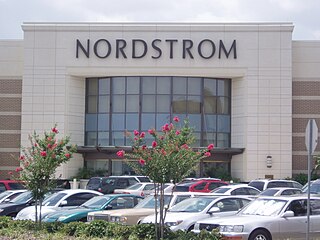Related Research Articles
Pueblo is a Puerto Rican supermarkets chain. It has been one of Puerto Rico's major supermarket chains since 1955.

The Great Atlantic & Pacific Tea Company, better known as A&P, was an American chain of grocery stores that operated from 1859–2015. From 1915 through 1975, A&P was the largest grocery retailer in the United States.

Acme Markets Inc. is a supermarket chain operating 161 stores throughout Connecticut, Delaware, Maryland, New Jersey, the Hudson Valley of New York, and Pennsylvania and, as of 1999, is a subsidiary of Albertsons, and part of its presence in the Northeast. It is headquartered in East Whiteland Township, Pennsylvania, near Malvern, a Philadelphia suburb.
Pathmark is a supermarket brand owned by Allegiance Retail Services, a retailers’ cooperative based in Iselin, New Jersey, USA. Pathmark currently has one location in East Flatbush, Brooklyn, New York, which it has operated since 2019.

Weis Markets, Inc. is a Mid-Atlantic food retailer headquartered in Sunbury, Pennsylvania. It currently operates 200 stores with over 23,000 employees in Pennsylvania, Maryland, New York, New Jersey, West Virginia, Virginia, and Delaware.

The Stop & Shop Supermarket Company, known as Stop & Shop, is a regional chain of supermarkets located in the northeastern United States. From its beginnings in 1892 as a small grocery store, it has grown to include 406 stores chain-wide.

The Food Emporium is a chain of grocery stores in New York and New Jersey. The supermarket banner was created by Shopwell Inc., whose roots can be traced to Daitch Crystal Dairies. Shopwell Inc. was acquired by The Great Atlantic & Pacific Tea Company (A&P) in 1986 and at the time, the company operated the upscale, gourmet banner stores in and around New York City; Westchester County, NY; and Fairfield County, CT. The Food Emporium grew throughout the 1990s, converting many of its New York-area A&P stores to The Food Emporium and expanding the chain to New Jersey. The 2000s brought new, stronger competition to the New York area, and the chain shrank, receding mostly to Manhattan. At the time of A&P's liquidation in 2015, The Food Emporium had 11 stores. The banner was acquired from bankrupt A&P in late 2015 by Key Food Stores Co-op, Inc., which currently operates thirteen of The Food Emporium stores.

Grand Union Supermarkets, later known as Grand Union Family Markets and often referred to simply as Grand Union, is an American chain of grocery stores that does business in upstate New York and Vermont, and used to do business throughout most of the northeastern United States. It operated stores in other areas of the country including the midwestern and southeastern states, and internationally in the Caribbean and Canada. The company was founded and headquartered in Scranton, Pennsylvania, and moved to Brooklyn, New York, in the early 20th century. Grand Union moved again to Elmwood Park, New Jersey and finally to Wayne, New Jersey before the company was forced into Chapter 7 bankruptcy in 2001 and sold to C&S Wholesale Grocers.

In US retail, an "anchor tenant", sometimes called an "anchor store", "draw tenant", or "key tenant", is a considerably larger tenant in a shopping mall, often a department store or retail chain. They are typically located at the ends of malls, sometimes in the middle. With their broad appeal, they are intended to attract a significant cross-section of the shopping public to the center. They are often offered steep discounts on rent in exchange for signing long-term leases in order to provide steady cash flows for the mall owners. Some examples of anchor stores in the United States are: Macy's, Sears, JCPenney, Nordstrom, Neiman Marcus, Saks Fifth Avenue, Dillard's, Kohl's, and Target. And in Canada; Hudson's Bay, Sears (formerly), Target (formerly), Zellers, Nordstrom/Nordstrom Rack (formerly), TJX Companies, Saks Fifth Avenue, Sporting Life.

Marsh Supermarkets was an American retail food chain headquartered in Indianapolis, Indiana, with a peak number of 86 stores in 2013 located throughout central Indiana and parts of western Ohio. Its eventual parent company was Sun Capital Partners, headquartered in Boca Raton, Florida.
The Penn Fruit Company was a regional grocery chain in the Philadelphia and Baltimore areas that operated from 1927 until 1979. During the firm's history it was regarded as one of the most innovative American supermarket chains. However, the company's innovations often were copied by its bigger rivals who eventually succeeded in causing the chain's demise.
Delchamps was a chain of supermarkets along the central Gulf Coast of the United States, headquartered in Mobile, Alabama. At the time of its acquisition in 1997, the company had 118 supermarkets in Alabama, Louisiana, Mississippi, and Florida and its stock was public traded on NASDAQ under DLCH.

The Plaza, formerly known as Evergreen Plaza, was a shopping mall in Evergreen Park, Illinois, United States. It was legally organized by Arthur Rubloff, who is also credited with coining the phrase "Magnificent Mile" describing the upscale section of Michigan Avenue north of the Chicago River to Oak Street. Rubloff secured the funding for the Evergreen Plaza from the Walgreen family who lived nearby in Beverly, Chicago. The Evergreen Plaza operated from 1952 to 2013. It featured over 120 stores, as well as a food court. The mall closed in 2013 and became an outdoor shopping center. Anchors include Whole Foods Market, and Burlington Coat Factory.

Food Fair, also known by its successor name Pantry Pride, was a large supermarket chain in the United States. It was founded by Samuel N. Friedland, and his brother George I. Friedland who opened the first store in Harrisburg, Pennsylvania, in the late 1920s. As of 1957, Food Fair had 275 stores, and at its peak, the chain had more than 500 stores. Friedland's family retained control of the firm through 1978, when the chain entered bankruptcy.

Wonderland Village is an outdoor shopping center in Livonia, Michigan, United States, a suburb of Detroit. The center is located at the southwest corner of Middlebelt Road and Plymouth Road, approximately one mile south of I-96. Opened in 1959 as the outdoor Wonderland Center, it originally featured Montgomery Ward and Federal's as its major anchor stores. A 1980s renovation enclosed the formerly open-air complex and renamed it Wonderland Mall, by which point the anchor stores were Montgomery Ward, Service Merchandise, and Target. This configuration lasted throughout the late 1990s, by which point the closure of both Service Merchandise and Montgomery Ward had led to a number of vacancies. The center reopened officially in 2007.

The Marbridge Building is an office building at 1328 Broadway, on the east side of Sixth Avenue between 34th and 35th Streets in Herald Square, Manhattan, New York City. It opened in 1909, an 11-story structure, utilized in part by men's clothier Rogers Peet. Until October 1910 it stood opposite the Alpine apartment house, which was at the northeast corner of Broadway and 33rd Street. The Alpine and old stores between 33rd and 34th Streets were demolished to make room for the $5,000,000 Hotel McAlpin near the end of 1910. On the other side of Broadway were located the Macy's Herald Square and Saks Incorporated stores, with the Gimbels store just below.

Rego Center is a shopping mall bordered by the Long Island Expressway, Junction Boulevard, Queens Boulevard, 63rd Drive, and 99th Street in the Rego Park neighborhood of Queens in New York City.

Fairway Market is a small American grocery chain founded in 1933 by Nathan Glickberg. It is one of the brands owned by the Wakefern Food Corporation, whose flagship supermarket cooperative network is ShopRite.
Interstate Department Stores, Inc., was an American holding company for a chain of small department stores, founded in Delaware in 1928. After a very rapid expansion as the result of acquisition and expansion of two discount store chains acquired in 1959 and 1960 and also two toy store chains acquired in 1967 and 1969, the firm was renamed in 1970 as Interstate Stores, Inc., to better reflect its business. Increased competition and the changes in consumer buying habits eventually led to decreased sales in the late 1960s and early 1970s which forced the firm to file for bankruptcy in 1974. After shedding all of its non-performing units, the firm was able to exit bankruptcy with the entire toy division intact along with a small remnant of the department store division in 1978. The firm was renamed Toys "R" Us upon emergence from bankruptcy.
References
- ↑ First National Stores Taps French to Follow O'Keefe As Chairman, Wall Street Journal, May 22, 1972, pg. 24.
- ↑ Supermarkets Leased, New York Times, March 20, 1955, pg. R8.
- ↑ Store Site Is Sold Near Amityville, New York Times, April 10, 1955, pg. R1.
- ↑ Hill's Supermarket Expansion, Wall Street Journal, October 17, 1961, pg. 32.
- ↑ "Hills Adding L.I. Markets". The New York Times . December 19, 1972. Retrieved November 4, 2009.("...will open five supermarkets on Long Island today. Including the store opened last week in Newburgh, N.Y., the latest openings bring the total number of stores in the Hill chain to 75.")
- ↑ Pueblo Sets Reserves Of About $14.1 Million For Its Store Closings, Wall Street Journal, November 29, 1976, pg. 17.
- ↑ "Hills to Shut Down Eight Supermarkets". The New York Times . November 30, 1976. Retrieved November 4, 2009. (reporting that eight more stores would close next Saturday, including five in Suffolk and one in Nassau, including Northport, Commack, West Babylon, Hauppauge, East Setauket, Plainedge (Bronx), and Yonkers)
- ↑ Pueblo International Says Food Fair Buys Supermarket Division, Wall Street Journal, May 10, 1977, pg. 20.
- ↑ Barmash, Isadore (November 15, 1978). "Food Fair Cites Daily Losses; Officers Resign". The New York Times . Retrieved November 4, 2009. ("Since its bankruptcy petition, the company has closed 42 Hills Supermarkets...")
- ↑ "The Undoing of L.I. Shopping Centers". The New York Times . April 1, 1979. Retrieved September 6, 2023.